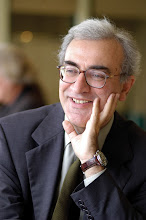Um leitor cuja liberdade de expressão se encontra condicionada pela participação do governo chinês no banco onde trabalha, e que, por isso mesmo, não pode identificar-se, pergunta-me o que penso eu da divergência pública entre Hilary Clinton e o comissário europeu Peter Mandelson a propósito do futuro do comércio internacional, assim resumida no Financial Times do passado dia 6 de Dezembro:
Hillary Clinton, the Democratic frontrunner in the US presidential campaign, came under fire from Europe's top trade negotiator yesterday for suggesting that, if elected, she might not press hard for a new global trade pact.
"The apparent scepticism about a Doha world trade deal that Mrs Clinton expressed in the Financial Times this week, and her suggestion that there is a need to shelter American companies and interests from foreign investment, are a disappointing sign of the times," said Peter Mandelson, European Union trade commissioner.
His remarks represented an unusually direct intervention by a foreign politician in a US presidential election, not least because he singled out the opinions of one particular candidate for criticism.
Em vez de responder directamente, prefiro dar a palavra a
Paul Krugman, um indiscutível especialista na matéria:
Those who think that globalization is always and everywhere a bad thing are wrong. On the contrary, keeping world markets relatively open is crucial to the hopes of billions of people.
But I am arguing for an end to the finger-wagging, the accusation either of not understanding economics or of kowtowing to special interests that tends to be the editorial response to politicians who express skepticism about the benefits of free-trade agreements.
It’s often claimed that limits on trade benefit only a small number of Americans, while hurting the vast majority. That’s still true of things like the import quota on sugar. But when it comes to manufactured goods, it’s at least arguable that the reverse is true. The highly educated workers who clearly benefit from growing trade with third-world economies are a minority, greatly outnumbered by those who probably lose.
As I said, I’m not a protectionist. For the sake of the world as a whole, I hope that we respond to the trouble with trade not by shutting trade down, but by doing things like strengthening the social safety net. But those who are worried about trade have a point, and deserve some respect.
Um caso complicado, como é evidente, que não pode ser respondido brandindo proclamações abstractas, mas apenas analisando caso a caso as consequências das políticas comerciais sobre os níveis de desigualdade económica e social.




Sem comentários:
Enviar um comentário